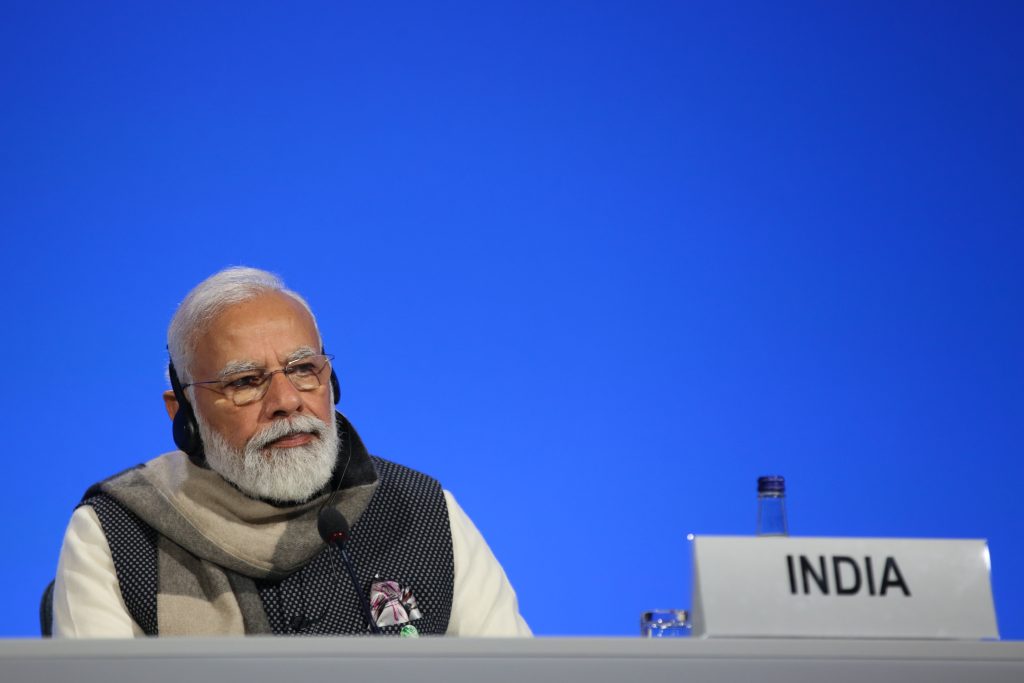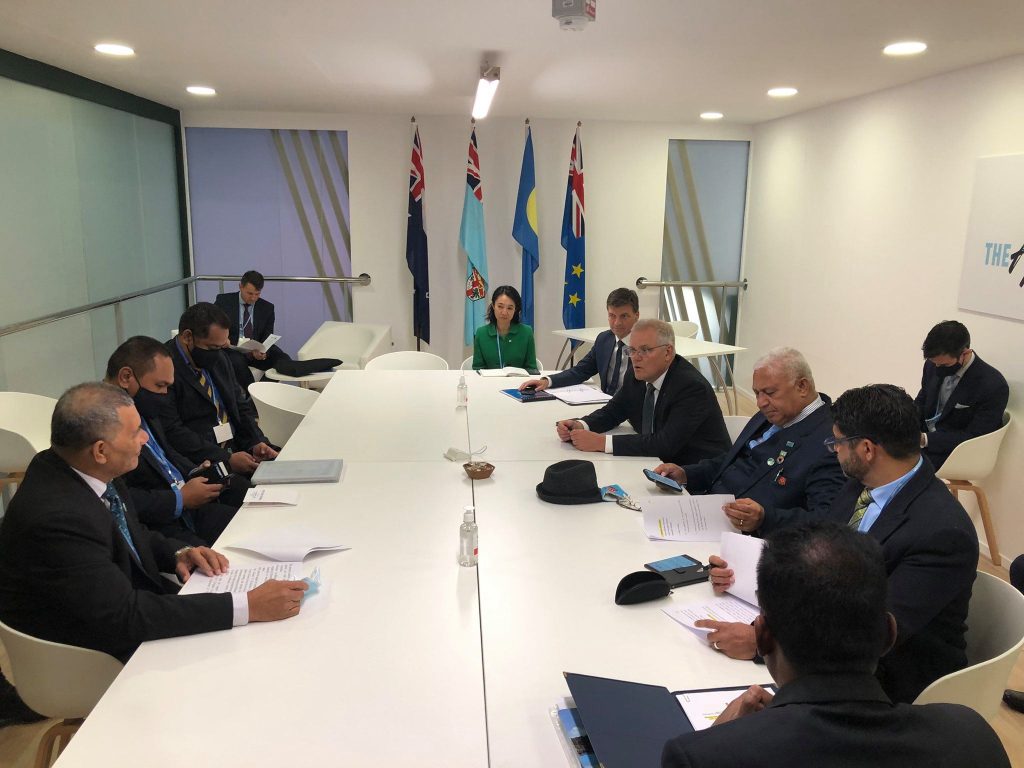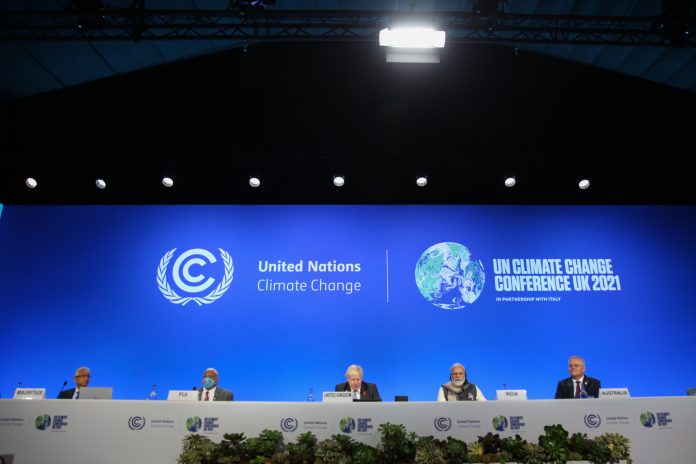By Pita Ligaiula in Glasgow
Fiji’s Prime Minister and current chair of the Pacific Islands Forum Frank Bainimarama has thanked his Indian counterpart, Prime Minister Narendra Modi for his leadership in the creation of Infrastructure Resilience for Small Island States, IRIS in a side-event on the second day of COP26 in Glasgow, Scotland.
Being the brainchild of the Indian-led Coalition of Developing Resilient Infrastructure (CDRI), Bainimarama joined Mr Modi, Prime Minister Boris Johnson of the UK, Scott Morrison of Australia, Prime Minister Andrew Holness of Jamaica and Pravind Jugnauth of Mauritius at the launch of the IRIS project.
Fiji he said recognizes the need to adapt building codes and standards to the climate reality, and that it be inclusive to its green priorities.
“Whether its storms, floods or fires, the same hard lessons are being learned around the world: building to last century’s standards is building to lose.
“The world is warming, the impacts are terrifying, and the standards we build to must be defined by, and readied for those intensifying risks.”
“It takes resources to build resilience.
“But we either pay to adapt now, or pay a much higher price in the aftermath of climate-driven devastation.”
Bainimarama speaks of the financing gap between vulnerability and resilience, and suggests that public and private sector sources of funding could be a solution.
“We trust this initiative will reach well beyond technical assistance and capacity building to unlock trillions in private sector capital.
“It can do that by de-risking critical investments now that will build resilience for those on the front line of the climate crisis.
“Fiji’s Relocation and Displaced Peoples Trust Fund, which establishes a proven process to move at-risk communities and their infrastructure, is one example of where those funds can make an impact.
In his remarks, Prime Minister Modi spoke about the urgency to assist the resilience of infrastructure in small island states.
“The world looks at these countries as spatially populated small island states, however I consider them to be large ocean states with immense capabilities,” said Modi who spoke in Hindi and his remarks were interpreted into English.
“Just like a necklace of pearls from the sea enhances everyone’s beauty, in the same way small island states surrounded by the ocean, greets the world with their beauty.
“I assure you that India will fully support this new project and will work together with the CDRI, with other partner countries and with the UN for its success.”
Prime Minister Modi further announced that India’s Space Agency ISRO will create a “special data window for small island states,” which will supply timely satellite information on cyclones, coral reef and coastline monitoring and other related data to small island states.

In his remarks, Prime Minister Morrison spoke of his government’s doubling of its climate financing contribution to $2billion, as well as a $10 million donation for the new IRIS initiative.
Bulk of Australia’s $2billion pledge would benefit its Pacific family of nation, Morrison said, ‘cutting out all the red tape and just getting all the projects on the ground.’
“If there’s anything we know, it is to stick with it, and to make a commitment to meet it and to beat it, and as our friends and family in the Pacific know and in South East Asia, we can be relied upon.
“We are helping our friends in PNG build resilient roads, bridges and wharves.
“We have helped with cyclone resistant produce markets for the Solomon Islands and Fiji, and last year our prefabricated schoolrooms in Vanuatu which withstood Tropical Cyclone Harold giving the community a place to shelter, as well as the kids a chance to return to schools sooner.
“All of us are here because we believe in a fair and practical action to address climate change and we are here because we are family, particularly our Pacific family.
“Look out for one another, look out for our mates as we say in Australia, lets stick together and lets get on with it.”

Prime Minister Johnson of Britain spoke of his most “harrowing experiences” listening to the plight of people living in small island states over the last few weeks and months as part of his preparation for COP26.
“Its so obvious for some people, some communities, some countries of this COP, the transformation that has been happening now is not a matter for our children or grandchildren.
“This is something that is an existential threat as we speak and sit here in Glasgow today.
“Last year, 600 billion tonnes of ice melted away in Greenland, all that has to go some where, and its incredibly cruel that these vulnerable, small island states are right in the front line of the loss and damage, that is caused by global warming, and of course as our friends have said, they have done virtually nothing to cause the problem.
“They didn’t produce the huge volumes of CO2 that had been pumped into the atmosphere, so I could encourage every countries that have been guilty of pumping CO2 into the air over the last whatever it is, 250 years, to join this campaign and help.
“That’s why we have made the $10 billion commitment a year as a crucial part of the UK’s presidency.”
Prime Minister Johnson also shared his new learnings of how to gesture the ‘keep 1.5 alive’ slogan, something he said he learnt from Fiji’s Prime Minister and chair of the Pacific Islands Forum, Frank Bainimarama.
“I think that we got to do it.
“We got to help people to adept.
“We got to mitigate.
“But above all, we got to change the numbers, we got to bend the curve, we got to stop this remorseless increase in CO2 because there are people in this room, there are populations, vulnerable populations who have done nothing to deserve it, will be in the front line and will suffer catastrophic loss and damages.”
SOURCE: PACNEWS















[…] Day 3. Photo: UNFCCC Credit: UNFCCC / PACNEWS UNFCCC / […]